[Dec 2007, Volume 4 Quarterly Issue] Pdf File size - The IIPM Think ...
[Dec 2007, Volume 4 Quarterly Issue] Pdf File size - The IIPM Think ...
[Dec 2007, Volume 4 Quarterly Issue] Pdf File size - The IIPM Think ...
Create successful ePaper yourself
Turn your PDF publications into a flip-book with our unique Google optimized e-Paper software.
MORE MARKETS, LESS GOVERNMENT<br />
Map-1: Ground Water Categorisation<br />
Source: NWR and WSD, Government of Gujarat<br />
ble,influence-free” administrative bodies<br />
that are able to design and implement the<br />
‘correct’ prices. In practice, this may often<br />
not be the case: these bodies could be captured<br />
by interest groups or they may be<br />
short-sighted and unable to estimate future<br />
demand, or they may be unable to set<br />
and collect appropriate water charges.<br />
Advocates of administrative approaches,<br />
however, often ignore these problems focusing<br />
at the same time on imperfections<br />
of markets that supposedly reduce the efficacy<br />
of market-based solutions! In effect,<br />
if two second best states are being compared<br />
it may be difficult to order them.<br />
<strong>The</strong> numerous informal water markets<br />
existing in North Gujarat (tubewell companies)<br />
and South Gujarat (illegal water<br />
lifting from canal) suggest that water users<br />
will buy and sell water even if it is illegal or<br />
discouraged by the government.<br />
Even though water markets are believed<br />
to change incentives for water user and<br />
improve water allocation, there are number<br />
of constraints that may prevent introduction<br />
of water markets. For formal water<br />
markets to work, one key component is for<br />
users to have some type of water right or<br />
use right they can buy or sell. This may<br />
create a serious problem not only because<br />
water rights may be difficult to establish,<br />
but also because public water agencies feel<br />
they will lose a great deal of power if they<br />
allocate water rights to users. If water users<br />
have rights, this means that system operators<br />
have the responsibility to deliver<br />
water to the users more or less when the<br />
users want it. In contrast, if a government<br />
agency holds the water rights, they can dictate<br />
farmers the conditions under which<br />
they will receive water including in some<br />
cases, necessary side payments from farmers.<br />
If water rights are made tradable, this<br />
creates an even greater dilemma for government<br />
agencies. To prevent losing control<br />
over tradable water rights, Comision<br />
Nacional del Agua in Mexico and some of<br />
the water districts of western United States<br />
limit trading among water districts. A water<br />
user must obtain special government<br />
approval to sell water outside the jurisdiction<br />
and any profits from the sale must accrue<br />
to district and not the seller. This, of<br />
course, discourages interdistrict trading,<br />
but reduces the chance that trades will<br />
have third party effect. Such instances of<br />
formal water markets in India are non-existent.<br />
Experience of Mexico, Chile, United<br />
States, France, where water markets<br />
exist in one form or the other, assists in<br />
understanding organisational problems of<br />
water trading through market. First is the<br />
resistance to water trading between or<br />
among district or jurisdiction. Second is<br />
the problem of establishing water rights<br />
and giving the users more control over water.<br />
Other problems which raise the transaction<br />
cost of water trading include legal<br />
challenges by third parties who feel they<br />
In the formal water markets water rights may be very diffi<br />
cult to establish. What's more, public water agencies feel<br />
that they will lose a great deal of power if they allocate<br />
water rights/user rights to users<br />
might be damaged by a transfer, the lack<br />
of sufficient infrastructure to transfer water<br />
among potential buyers, and lack of an<br />
effective means for verifying and enforcing<br />
water rights.<br />
Establishing Water Markets<br />
Before we determine whether there is a<br />
need of reducing transaction cost and<br />
methods to do so, there is a need to understand<br />
the past experience of markets for<br />
allocating water resource. This is done<br />
with the assumption that if a country has<br />
experience with water markets, then it is<br />
THE INDIA ECONOMY REVIEW<br />
99


![[Dec 2007, Volume 4 Quarterly Issue] Pdf File size - The IIPM Think ...](https://img.yumpu.com/29766298/98/500x640/dec-2007-volume-4-quarterly-issue-pdf-file-size-the-iipm-think-.jpg)
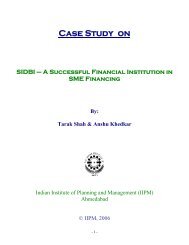
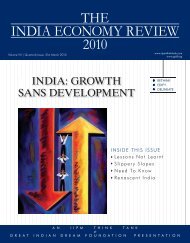
![[Feb 2008, Volume V Annual Issue] Pdf File size - The IIPM Think Tank](https://img.yumpu.com/43961117/1/190x245/feb-2008-volume-v-annual-issue-pdf-file-size-the-iipm-think-tank.jpg?quality=85)
![[June 2008, Volume V Quarterly Issue] Pdf File size - The IIPM Think ...](https://img.yumpu.com/41693247/1/190x245/june-2008-volume-v-quarterly-issue-pdf-file-size-the-iipm-think-.jpg?quality=85)
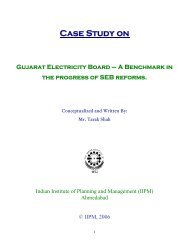
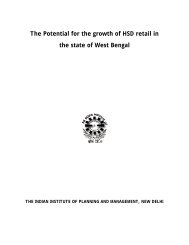
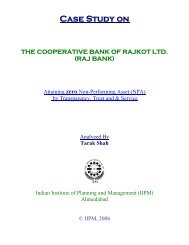


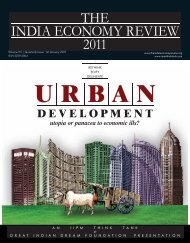
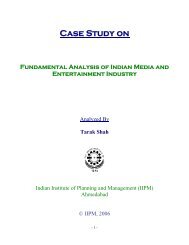
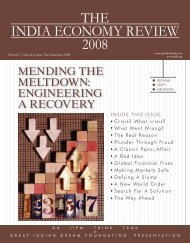
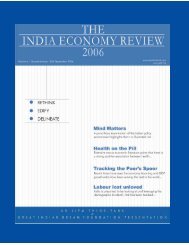
![[Volume VI | Quarterly Issue: 31st May 2009] Pdf File size](https://img.yumpu.com/27796051/1/190x245/volume-vi-quarterly-issue-31st-may-2009-pdf-file-size.jpg?quality=85)